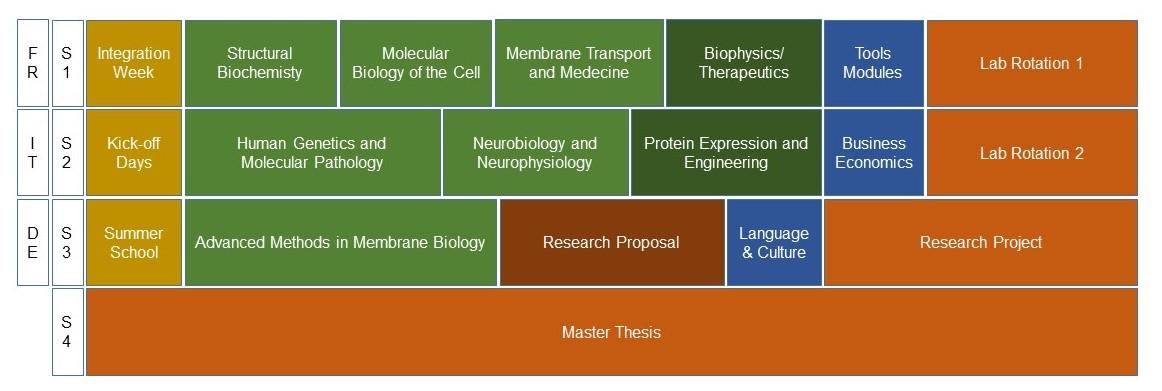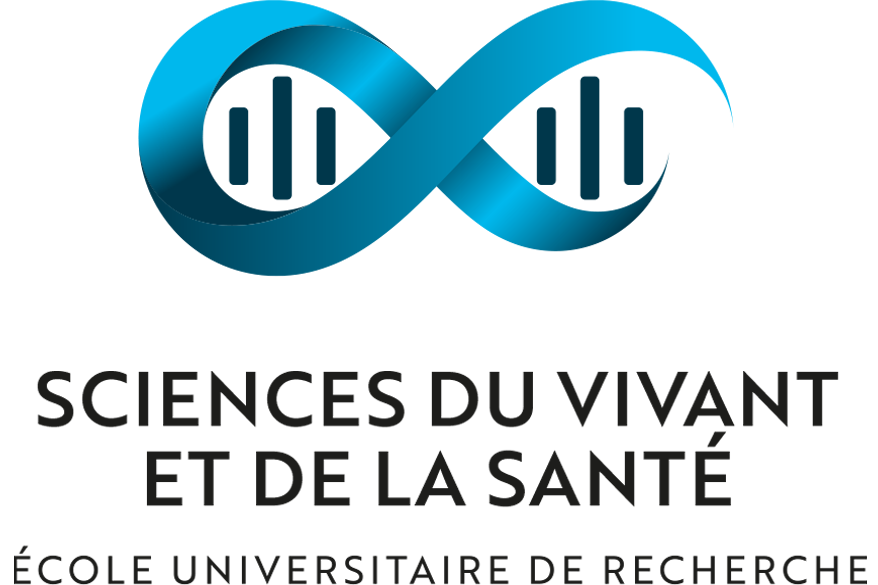Figure 5 : Diagram showing the organization of the programme into modules

Semester 1
The first semester in UniCA will provide the students with the foundation on structure and function of biological membranes. The courses will focus on the physicochemical properties of biomembranes and on understanding the molecular and cellular properties of the constituents of cell membranes, mainly lipids and proteins.
Three compulsory courses (in green) will introduce all MemBioMed students to the structure, composition and functions of biological membranes from a biochemical (Structural Biochemistry), a molecular (Molecular Biology of cellular membranes) and a physiological (Pathophysiology of Transport and Medicine) point of view. Students will then choose one between courses on offer (in dark green): Biophysics, Kinetics for modelling molecular mechanisms, New therapeutic approaches, Genetics of major diseases…. The thematic training in the first semester is supplemented by Tools Modules (in blue) that enable students to acquire cross-disciplinary skills (animal experimentation, biological image processing, life imaging, organoids, bioinformatics and biological imaging techniques for research and medicine). Dedicated practical training in a research laboratory is provided by a 6-week lab rotation (in orange) at the end of the semester in one of the various research teams from UniCA.
Semestre 2
The second semester in UniGe will provide the students with a comprehensive understanding of biomembranes-related pathologies and neurological functions. The courses will focus on the genetics and the molecular bases of disease, as well as the function and dysfunction and on therapeutics strategies used to modulate neuronal activity.
The 2 main modules of this semester (in green) provides in-depth knowledge of the molecular and cellular mechanisms related to human pathologies (Human Genetics and Molecular Pathology and Neurobiology and Neurophysiology). The teaching methods are split between frontal lessons (2/3) and laboratory activities (1/3), with the latter involving optical microscopy, immunocytochemistry and electrophysiology. Since the focus of this semester is on the protein components of biological membranes, which are the main targets in the search for new drugs, a specific training will enable students to master the theoretical and practical knowledge of protein expression and engineering (in dark green) and thus be better prepared for laboratory rotations and the Master's thesis. On top of the scientific modules, students will follow a business economics course (in blue), in which they will acquire a basic knowledge of the organizational aspects of a company (Creation, Organization and Management of Company). A second Lab Rotation is required at the end of the semester in the form of a 6-week internship (in orange) in the various research labs or industrial partners from UniGe.
Semestre 3
The third semester in Osnabrück will focus on preparing the students for their master theses by providing methodological specialization in the field of cellular nanoanalytics. The courses will focus on advanced techniques to investigate biological functions at cellular membranes with highest spatial and temporal resolution.
A compulsory Master module in Methods (Advanced Methods in Membrane Biology, in green) specifically designed for the MemBioMed programme will provide comprehensive training in membrane biology methodologies through a balanced combination of lectures and practical courses. The Research Proposal module (in brown) is a MemBioMed-specific module that focuses on developing skills in formulating, presenting, and defending a research proposal and designed to prepare students for the research phase of their master's program. The practical part in semester 3 will also focus on professional qualification in solution-oriented research. Within an 8-week lab internship, a concise Research Project will be tackled. Supervised by a PhD student or Postdoc, students will carry out independent practical work, mainly experimental, on a research question in membrane biology from the current research areas of one of the biology research groups at the SFB 1557 collaborative research centre or associated partners. Before the beginning of the semester, students will take part in a German language and cultural course (Language and Culture).
Master thesis
The Master's thesis can be prepared in any of the full partner’s institutions or associated partners. Projects from academia and industry are presented to students during the summer school between semesters 2 and 3, promoting direct interaction of students with supervisors. In addition to classical Master projects, supervised by a single supervisor, we also want to offer Masters projects with dual supervision by researchers from two laboratories.
Special Events
- Integration week
-
This event will take place during the first week of September. It concludes with a graduation ceremony for students who have completed the programme. It will be organized by UniCA, which is in charge of the first semester and is also the coordinator of the programme. A variety of activities will be organised in the spirit of celebrating the importance of international, European and cultural diversity. The programme coordinator officer, advised by the Welcome Center and UniCA’s International Office, will disseminate information for entering students including solving administrative matters (bank account, housing, registration, emergency contacts…). The students will also meet the consortium partners, researchers and administrative staff during Academic Sessions, and receive courses on fundamental concepts required to successfully tackle the master programme. Important skills will be acquired during this week including lab safety rules and soft skills essentials to start a Master programme (bibliographic research, PowerPoint presentation, speaking in public…). Students will be invited to technical visits of UniCA campus and research and facilities centers on site. In addition, a Gender Agenda and discussions on inclusion, diversity and equity will be included on the week schedule. Social interaction will be promoted in the form of city tours, cultural visits or typical dinners. Second-year students and graduates from previous intakes (alumni panel) will be invited to meet the new students for exchange and mentoring. One day will be devoted to the Master's graduation ceremony, attended by students of all levels.
- Kick-off days
-
This event is designed to help students ensure efficient on boarding at UniGe. It will take place at the end of February/beginning of March between semester 1 and 2. Local academic and administrative coordinators of UniGe will be present, as well as participating lecturers, researchers and other administrative staff from UniGe. They will introduce students to the various resources available at UniGe, both academic (libraries, research activities, etc.) and in terms of student life (support services, clubs, events, etc.). These kick-off days will provide an opportunity to review the first semester and to clarify the expectations for the second semester.
- Summer school
-
A one-week thematic school will be held between semester 2 and 3 as an integrative part of the study programme and compulsory element of the curriculum. The thematic school covers more in-depth a selected theme, which may vary from year to year (Biomembranes & Cellular Microcompartments, Biomembranes, Pharmacology and therapeutics…). This summer school, organized by the three partner universities, will take place in Osnabrück and includes a series of lectures and workshops on a chosen topic in relation to the programme. During this symposium, supervisors will present Master thesis projects. The summer school will also include activities with academic and administrative staff at UOS to ensure efficient onboarding for semester 3. Projects for the research project of the upcoming semester will be presented and a speed dating internship session will be organised and a Networking and Career event will also be offered to connect students with the private sector research community There will also be many opportunities for students and researchers to meet and interact with each other, as well as with other students from UOS.

